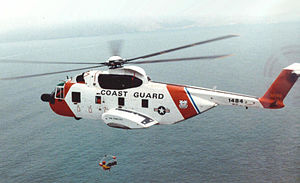
The Sikorsky S-61R is a twin-engine helicopter used in transport or search and rescue roles. A developed version of the S-61/SH-3 Sea King, the S-61R was also built under license by Agusta as the AS-61R. The S-61R served in the United States Air Force as the CH-3C/E Sea King and the HH-3E Jolly Green Giant, and with the United States Coast Guard as the HH-3F "Pelican".
The Sikorsky S-61R was developed as a derivative of their S-61/SH-3 Sea King model. It features a substantially revised fuselage with a rear loading ramp, a conventional though watertight hull instead of the S-61's boat-hull, and retractable tricycle landing gear. The fuselage layout was used by Sikorsky for the larger CH-53 variants, and by the much later (though similarly-sized) S-92.
Sikorsky designed and built an S-61R prototype as a private venture with its first flight in 1963. During its development, the US Air Force placed an order for the aircraft, which was designated CH-3C. The Air Force used the CH-3C to recover downed pilots. The CH-3E variant with more powerful engines would follow in 1965.